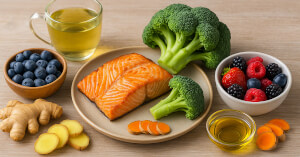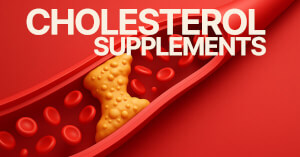
Garlic
Garlic is a potent herb with antimicrobial properties, known for supporting heart health and immune function.
Garlic (Allium sativum) is a culinary staple and medicinal herb known for its cardiovascular and immune benefits. It has been used for centuries across cultures for both flavor and health support.
Garlic contains sulfur compounds like allicin, which may help reduce blood pressure, lower cholesterol, and support immune defense. Supplements often use aged garlic extract to minimize odor and enhance absorption.
Garlic is commonly taken to support heart health, immune function, and metabolic balance. Many studies back its cardiovascular effects, though dosage and preparation methods greatly influence its potency.
Other names & forms of Garlic supplement : allium sativum, garlic bulb, aged garlic extract, garlic powder
Possible Benefits
The benefits of garlic include cardiovascular support, immune defense, and antioxidant protection:
- Helps support Heart Health by reducing blood pressure and improving cholesterol levels
- Contributes to Blood Flow & Circulation by promoting vasodilation and reducing clot formation
- Enhances Immunity thanks to its antimicrobial and antiviral properties
- May support Detoxification & Cleansing by stimulating liver enzymes
Side Effects
When you incorporate Garlic into your daily routine, you may enjoy immune support but might also notice a few mild reactions. Keep an eye out for:
- Garlic breath and body odor, which can be persistent
- Mild gastrointestinal upset, nausea, heartburn, or diarrhea, especially if taken on an empty stomach
- Possible mouth or esophageal irritation when chewing raw cloves or strong extracts
- Increased bleeding tendency (e.g., easy bruising) in sensitive individuals
- Rare allergic reactions, rash, itching, or swelling, in those with Allium sensitivities
Interactions
Possible interactions include:
- Anticoagulant and antiplatelet drugs: Garlic’s allicin may potentiate warfarin or supplements such as Ginkgo Biloba, leading to increased bleeding risk.
- Antihypertensive medications: Its mild vasodilatory effect can add to ACE inhibitors or L-Arginine, so monitor blood pressure to avoid hypotension.
- Antiretroviral drugs: Garlic supplements can reduce plasma levels of protease inhibitors (e.g., saquinavir); avoid coadministration or space dosing significantly.
- Antidiabetic agents: Garlic may enhance insulin sensitivity; combined with insulin or Cinnamon, it could heighten hypoglycemia risk.
Precautions
Before you start taking Garlic supplements, make sure to check if any of the following apply to you. If they do, consult your healthcare provider:
- Pregnant or breastfeeding women: While culinary amounts are safe, high-dose supplements may increase bleeding risk; use under medical supervision
- Individuals on blood-thinning medications: Garlic can potentiate anticoagulant effects; monitor coagulation parameters closely
- People with bleeding disorders: May exacerbate bleeding tendencies; avoid high doses
- Those with gastrointestinal ulcers or reflux: Garlic may irritate the stomach lining; take with food or consider enteric-coated formulations
- Patients scheduled for surgery: Discontinue at least two weeks prior to avoid excessive bleeding during and after the procedure
Studies
These studies provide scientific insights into Garlic benefits:
A 2013 Cochrane review of 7 RCTs concluded that garlic at 600-900 mg/day modestly lowers systolic BP by 8.4 mmHg and diastolic BP by 7.3 mmHg in hypertensive patients versus placebo.
A 2015 randomized trial in 50 hyperlipidemic adults found that 2.4 g/day aged garlic extract for 8 weeks reduced LDL-C by 10 % and increased HDL-C by 5 % versus placebo.
A 2010 RCT showed that 600 mg/day garlic powder for 12 weeks did not significantly affect platelet aggregation or bleeding time versus placebo , despite traditional use as an antithrombotic.
A 2011 double-blind study in 40 adults with metabolic syndrome reported no significant changes in fasting glucose or insulin resistance after 12 weeks of garlic supplementation versus control .
Disclaimer: This page is for educational purposes and does not replace medical advice. If you're pregnant, have a condition, or take medication, speak with a qualified professional.










